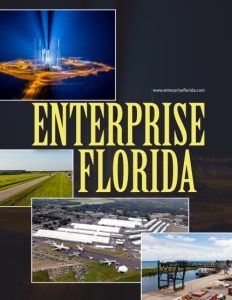Enterprise Florida
Creating jobs and businesses
Business View Magazine sits down with Enterprise Florida, Inc. (EFI) the principal economic development organization for the Sunshine State.
Enterprise Florida, Inc. (EFI) is the principal economic development organization for the Sunshine State. A public-private partnership between Florida’s business and government leaders, Enterprise Florida is funded both by the State of Florida and by private-sector businesses. It was first created in 1996, in the belief that, with hands-on participation by Florida businesses, Florida could move from its traditional economic drivers of tourism and agriculture to a sophisticated mix of industries and international business. Thus, Florida became the first state in the country to place principal responsibility for economic development, international trade, research, and business image marketing in the hands of a business-government partnership.
Enterprise Florida’s ongoing mission is to expand and diversify the state’s economy through job creation, while championing Florida as the premier location for capital investment and business expansion and relocation. EFI recruits new business to the state, and works to retain and expand existing industry and business, focusing its economic development efforts on a wide range of industry sectors, including: aviation & aerospace, life sciences, information technology, defense & homeland security, clean energy, financial & professional services, and manufacturing.
In 2011, Florida moved to optimize its economic development structure by creating the Department of Economic Opportunity (DEO) and giving Enterprise Florida’s President and CEO the additional title of Secretary of Commerce. A policy-driven Board of Directors, comprised of appointed members and a diverse group of investors representing some of the nation’s most notable corporations in Florida, oversees EFI’s operations. In addition, each member of the Florida Cabinet holds a position on the Board and the governor serves as the Board Chairman.
Recently, Business View Magazine spoke with two members of Enterprise Florida’s leadership team: CEO, Peter Antonacci, and Senior Vice President for International Trade and Development, Manny Mencia. The following is an edited transcript of those conversations:
BVM: Peter, what are Florida’s strengths as a state to do business in? If I wanted to open a new business or relocate to Florida, what would you tell me are some of the state’s benefits?
Antonacci: “Everything comes under the heading of ‘business climate,’ and what we have is special. So, that includes permitting. The larger the business, the more permitting challenges, and even if you set up a small business, you have some permitting issues. Our permitting system is user-friendly.
“There’s no personal income tax and the corporate income tax system has been ratcheted back over the last seven years, so the corporate income tax atmosphere is very positive. We are a right-to-work state, which means you don’t have to join a union to have the privilege of working. We have an excellent K-12 education system, and after K-12, our apprenticeships, our certification programs are excellent. So, we’ve got a robust workforce that’s highly trained, and if they’re not trained, we have facilities here to train them. We think that markets mean a lot, and between our airports and our seaports, we’re a gateway to the world.”
BVM: How does Enterprise Florida connect with businesses who want to come to Florida?
Antonacci: “We continue to work with our site selection community to show our wares. If you’re not showing your wares all the time, you’re easy to forget, so we’re out there every day with our site selectors, showing what we have.”
BVM: Does being a public-private partnership help those outreach efforts?
Antonacci: “Some believe that government doesn’t communicate on the same wavelength as business, and we want to get government and business to communicate more effectively. The economic development undertaking of a state works best if you put the business world into the business of economic development with a government partner. And it’s worked very well in Florida. We have businesses that put up their good money to be part of this undertaking because it’s a real value to them.”
BVM: Do you see any opportunities for improvement in Enterprise Florida’s effectiveness?
Antonacci: “Here’s what I think is the challenge: every day is a different day, and it’s hard to see what’s going to happen tomorrow. What the state has to do, to improve its human capital infrastructure, is to work with our education system, all the time, to make sure that it’s keeping up with what industry is doing. Industry changes pretty quickly and you have to be nimble to respond. So, for example, this past year the legislature appropriated a portion of $85 million for specialized workforce programs, so that our colleges and schools can access resources to develop these kinds of quickly-changing job needs in their communities. And if we don’t do that, we fall behind, because people in other states are working just as hard.”
BVM: And yet, there are some in the state legislature who don’t believe that the government should be funding business development at all – or even doing business with business.
Antonacci: “I don’t think that any of the legislators are opposed to business and government working together to make Florida a better place. But where the debate sharpens is in the area of taxpayer incentives. Incentives are controversial because taxpayers don’t oftentimes see the immediate value in the expenditure of their money. And that controversy opens up the question: Is this a proper thing for government to do? So, it gets into the philosophy of governing.”
BVM: What’s on your agenda as Florida’s Secretary of Commerce?
Antonacci: “My agenda is coterminous with our Governor’s agenda – get people around the world and around the country to invest in Florida either with their capital or with their businesses. Our metrics show that we do a pretty good job of bringing capital to Florida, and the issue of bringing business to Florida is one that we work on assiduously, every day. We have a great product to sell and always have exciting things happening. Florida is open for business and we mean it.”
BVM: Manny, can you talk about the responsibilities of your position?
Mencia: “I manage the State of Florida’s trade development programs, which is helping Florida companies – with a strong emphasis on small and midsize companies – to find new clients, and sell their products in markets around the world. We work on the export side with between 2,200 and 2,500 small or mid-size Florida companies, every year. My unit is deployed statewide; I have field offices in Pensacola, Jacksonville, Tampa, Orlando, Palm Beach, and my headquarters in Miami. Each of those offices has a territory they are responsible for. You need to have people in the market that can visit a company and assess its export readiness.
“I also manage our network of foreign offices in 12 countries around the world, which are there to promote Florida, to develop foreign direct investment leads, and to support our trade programs. And, as I see my mandate, it is also to help Florida companies diversify their exports; to find new markets in places like Asia, the Middle East, European Union, and Africa.
“So, I do all the exports and I help with the generation of foreign direct investment leads from other parts of the world that want to invest in Florida.”
BVM: Where does most of the state’s foreign investment currently come from?
Mencia: “Roughly two thirds, maybe a little more than that, of Florida’s identifiable foreign direct investment comes from two sources: the European Union and Canada. So, obviously, while we pursue, welcome, and promote investment from other regions, you do want to focus a significant part of what you do on those markets that have clusters of large, multi-national companies that tend to drive foreign investment. Four of our foreign offices are based in the EU – Madrid, London, Paris, and Germany. Japan is another investment market after Canada and the EU, so we have an office in Tokyo. The main thrust of those offices is foreign direct investment lead generation.”
BVM: On the export side, how does Enterprise Florida help small Florida companies?
Mencia: “We provide them with what we like to think is a pretty comprehensive program that runs the gamut. We talk to them about their export readiness, market selection, i.e. what are best markets for their products; we help them with market research and information; we talk to them about the channels of distribution in those markets, and, oftentimes, introduce them to our foreign offices for support.
“For those companies that are less experienced, or fairly new to exporting, or are infrequent exporters, we have a strategic alliance with the Small Business Development Center Network in Florida, and are able to subsidize for them, a company-specific export marketing plan – a roadmap to expanding their exports.
“My main tool for helping them after we qualify them and provide the best marketing information for them, etc., is to help them find a client and enter the market. So, we do, roughly, 30 international trade shows and trade missions every year. We focus our trade shows on the largest world-class aerospace and aviation defense shows; the large medical hospital/ pharma products exhibitions; IT; the marine industry. And we do shows in other sectors: security, transportation, and others.
“Aviation and aerospace is probably Florida’s largest industry cluster; medical – we’re the second largest manufacturer in the nation of medical device products. We have a very fast growing IT sector in Florida – some 30,000 companies and growing fast. So, on the trade show side, we are very focused on those major sectors in Florida which are also high-growth and high-wage.
“We also do trade missions, which are different than trade shows. They tend to be focused on growing international markets – Latin America, some in Africa, some in Asia – and those are, essentially, matchmaking missions. We recruit a group of companies; we vet their products to make sure they are in demand in that market, and then we work with U.S. Commercial Services and the U.S. embassy in that country, to help them line up individual appointments with companies interested in their specific product line. And then, they have high-value individual business meetings called Gold Key meetings.
“We also do educational events around the state, where we bring one of our foreign officers, or a floating commercial officer, and we talk about business opportunities – we call them ‘road shows’ – ‘Business Opportunities in South Africa’; ‘Doing Business with the World Bank’; ‘Exporting to Turkey.’
“We have a Florida export directory, online. Any Florida company can register there for free, so we can promote their products through this site, throughout the world. We have a newsletter to inform Florida companies about export opportunities, the trade shows that we do, all the partner events, etc. It goes to 10,000 Florida companies that are in our data base.
“We also help companies in the form of a grants program, which are small grants designed to help a manufacturer or a high technology company go into new markets. Say you want to go to a trade show – we are able to offset 50 percent of the standard exhibition costs. When you go on a trade mission, the U.S. Department of Commerce charges a fee to make appointments, provide the translator, and so on. We have a grant for a new to market manufacturer or high tech company – we will pay the cost of your Gold Key meeting, 100 percent.
“And the final one, which we just created recently: we are helping Florida companies localize their website. Say you just got back from ‘Arab Health,’ the largest medical show in the Middle East and you did well enough on that show that now you think that you should have a website in Arabic. We have a program to help offset part of the cost of translating the website. Let’s say you go to a show in Singapore and you want your website in Mandarin – we’re able to help you do that.
“Remember: export development is a tool of job creation, just like investment recruitment. The difference is that job creation, in this case, comes indirectly. We help the company sell its products, and because of those expanded sales, the company grows organically and adds jobs. It’s a huge job engine. Roughly one out of every six jobs in Florida comes from exports or foreign direct investment.”
BVM: “What do you say to those who suggest that the government should not be helping companies at all; that it should stay out of the ‘free market’?
Mencia: “When it comes to the export side, I think most people, even those who are philosophically opposed, believe that there is role in helping small business; that they do need the extra push in order to succeed and the payoff is extremely significant. When companies grow through export, those products are created organically – good companies with good products going to markets to create wealth in the local community and expand the job base. I believe that it’s in the national interest and the state interest to support small exporters. And our mission is to facilitate that.”
BVM: What are some of the most significant objectives that you have for your division over the next several years?
Mencia: “On the export side, it’s a very simple equation: retain or possibly expand market share in Latin America and the Caribbean and, at the same time, continue to diversify our exports to other parts of the world. Right now, a little over 60 percent of everything Florida companies export goes to Latin America and the Caribbean; about 20 percent to Asia; a little less than that to Europe; and then the rest of the world. It would be great if it were more like, 50/50 – 50 percent to Latin America and the Caribbean and 50 percent spread out to the world. That is a long-term goal: to better balance our export market share.
“And Florida could not be more ideally positioned to do more international business. If you look at our geographic position, we are at the very epicenter of the Western Hemisphere. We are also in an ideal position for east/west trade, particularly after the expansion of the Panama Canal which will result in increased business formation. I believe that if you’re a Florida manufacturer, the path to growth and increased sales is international business. And the statistics bear that out – Florida is the number two state in the nation in what the National Association of Manufacturers calls ‘manufacturing export intensity’ – that is the percentage of what you produce that is sold overseas and not in the domestic market.
“Also, Florida is one of the very top states in terms of the percentage of exports by small business. In 2016, Florida exported about $52 billion worth of tangible products. Out of those, almost two thirds were sold by small businesses. The national average is less than a third. So, it’s strategically important to help manufacturers export. If we want to keep growing the export pie, keep bringing more money into the state, creating more jobs, helping small business is important.”
“Number two: take advantage of the expansion of the Panama Canal and the new generation of commercial aircrafts that make direct flights between Asia and Florida to help Florida companies do more business in Asia. Three: help more infrequent or non-exporters among manufacturers to get into the business and once they’re in the business, diversify their exports.
“Another key objective would be to expand Florida exports and trade with Mexico. We have a market share of roughly 30+ percent of everything the United States sells to everybody else in Latin America and the Caribbean, but our share of Mexico’s market in terms of U.S. exports is less than two percent. Why? Mexican/U.S. trade has always gone through the border. So, we are trying to divert trade to the Florida ports and airports. If we were to add one or two percent of export market share to Mexico, that would be billions of dollars in exports because that relationship is so huge. And it’s doable because our transportation costs by sea are very competitive to the cost of shipping something over the border.”
Check out this handpicked feature on Leon County, Florida – “Leon County Realizing Return on Vision (ROV)”.
AT A GLANCE
WHO: Enterprise, Florida
WHAT: A public/private economic development organization
WHERE: Orlando, FL
WEBSITE: www.enterpriseflorida.com


